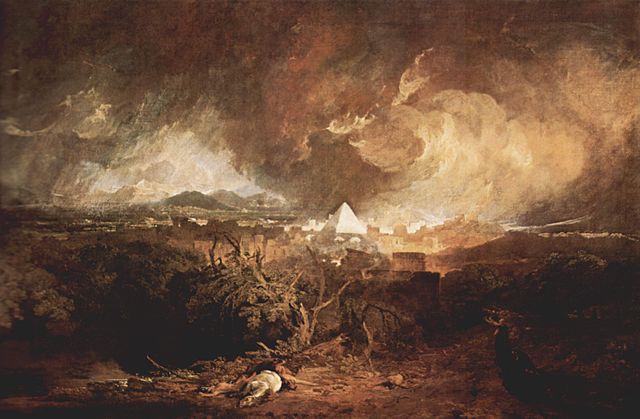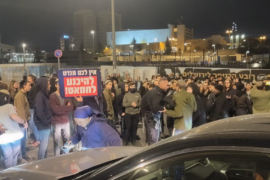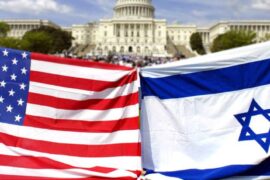The Broader Theme of the Exodus
Among our Torah’s narratives, there is perhaps none more universally well known than the Exodus, the story of the Israelite redemption from ancient Egypt and deliverance into the promised land. While the Exodus serves as a cornerstone foundation for many liberation movements, its internal Hebraic narrative and psychosocial dynamics are much less explored in the public consciousness.
In further delving into these features of the Exodus, however, the external analyst becomes attuned to a rather revolutionary rendition of liberty which transcends mere physical shackles and delves into the complete individual and national annihilation of mental slavery. The emerging archetype of Hebraic liberty resultantly showcases a model in which the oppressed purge their inner selves from internalized inferiority by culturally and militantly usurping their adversaries.
Hebraic Anti-Paganism as the abomination of Egypt
In the prelude to the full Exodus story, the Torah relays how the Hebrews came to dwell in Egypt. In the aftermath of Pharaoh’s second-in-command, Tzofnat-Paneaḥ, revealing to the children of Israel – who had descended to Egypt in order to procure food provisions for their family amid Canaan’s famine – that he was indeed their missing brother Joseph, he invites his brothers to remain in Egypt, and sends out a delegation to Canaan to summon their elderly father to do the same.
During this junction, Joseph relays to his brothers that when Pharaoh inquires of them as to their profession, they should respond that they, like their forefathers, are shepherds – for only this will grant them permission to dwell in the geographic isolation of Goshen (i.e., the Nile Delta), as all shepherds are “the abomination of Egypt” (B’reishit 46:34).
Presumably, the act of grazing and consuming certain livestock was an affront to Egyptian society. This is also attested to earlier in the narrative where, prior to the brother’s knowledge of Tzofnat-Paneaḥ’s true identity, the brothers are seated at his royal table – albeit separated from the Egyptians, “…because the Egyptians could not eat food with the Hebrews, as it is an abomination to the Egyptians” (B’reishit 43:32).
The medieval rabbinic commentator, Rabbi Shlomo Yitzḥaqi (Rashi), attests to such in his commentary on the aforementioned verse:
Because all shepherds are an abomination to the Egyptians: Because they (i.e., the sheep/goats) are their gods.
Already from before their enslavement, then, the Hebrews – being unconcerned traffickers and consumers of the animals which cultic Egyptian theology deified – were slated as the ire of Egypt.
It is against this backdrop that the novelty of the Exodus narrative unfolds.
Early Negotiations for the Israelites’ Release: The Necessity for No Capitulation
Early in the narrative, Moshe is commanded by the Creator to go to Pharaoh’s palace and implore for the emancipation of the Israelites.
At this point in time, the Hebrews had been subject to Egyptian servitude for approximately two centuries, their forefathers falling out of the Egyptian leadership’s grace upon the installation of a new Pharaonic dynasty which “did not know Joseph” (Ex. 1:8).
During the span of Moshe’s various implorations, Pharaoh’s heart is said to have been “hardened” several times over, whether due to the Creator’s intervention (e.g., Sh’mot 9:12; 10:1; 10:20; 10:27; 11:10; 14:8) or his own volition (e.g., Sh’mot 8:15; 8:32; 9:34).
As shall be seen, this hardening was necessary to build up to an ultimate liberation which would otherwise have been compromised by accomidation.
After seven of the ten plagues struck Egypt, Pharaoh finally begins to show signs of relenting. When Moshe is yet again deployed to Pharaoh’s court to warn of the upcoming plague of locusts, Pharaoh faces pressure from his court to acquiesce to the Hebrews’ earlier request to venture to the wilderness for a three-day festival. While Moshe’s original request (Sh’mot 5:3) had fallen on deaf ears, this time (Sh’mot 10:8) Pharaoh resummons Moshe and Aharon and agrees to allow them to serve their G-d in the wilderness. But when Moshe informs Pharaoh that the attendees of this festival will include elders, women, children, and livestock (having the men’s families remain in Egypt would arguably serve as collateral to ensure the Israelites do not discreetly escape permanently), Pharaoh rejects the request, arguing that only the men can be allowed to go (Sh’mot 10:10-1).
The ninth plague of Ḥoshekh (“Darkness”) then commences (Sh’mot 10:21-3); upon its conclusion, Pharaoh summons Moshe and informs him that he can indeed leave – even with the children this time (Sh’mot 10:24).
There is only one caveat: the livestock must stay (ibid.).
Defiant, Moshe counters: “But Moshe said, “You too shall give sacrifices and burnt-offerings into our hands, and we will make them for HaShem our G-d. And also our cattle will go with us; not a hoof will remain, for we will take from it to worship HaShem our G-d, and we do not know how we will worship HaShem until we arrive there.” (Sh’mot 10-25-26)
While it is not completely clear why Pharaoh insists the livestock remain – perhaps it was to serve as collateral; perhaps it was to defend the dignity of Egypt’s deity; perhaps both – the bottom line is that there is a caveat, and this is unacceptable to Moshe.
Moshe responds by not only rejecting the conditional concession out of hand, but boldly asserting that the Egyptians themselves would provide these sacrifices to the Israelites, arguing that the means of servicing the G-d of the Hebrews cannot be determined until the Israelites venture into the wilderness. It is in the aftermath of this exchange that the climax of the oppressed-oppressor resistance kicks into full gear.
Following the Creator’s final hardening of Pharaoh’s heart prior to the Exodus (Sh’mot 10:27), Pharaoh dismisses Moshe from his royal court, warning that he shall no longer see his face, “…for on the day that you see my face, you shall die!” (Sh’mot 10:28). HaShem informs Moshe that He will bring upon Egypt a final plague, after which “…he will send you [all] from here; when he sends you out, he will completely drive you out from here” (Sh’mot 11:1).
In Biblical Hebrew, doubled language implies stressed emphasis; the verse’s wording of “guraish yigharaish ethkhem” (“drive-drive you out”) – described as being kuluh (“complete”) – implies that there had hitherto been lacking elements to a complete redemption. Indeed, this is seen from the aforementioned caveats and limitations set by Pharaoh in negotiating their release. This time, unlike before, the Egyptians will be forced to completely concede, and it would be the Israelites – not their oppressors – who set the terms for their release. Their Exodus would also not be a conditioned sojourn to the wilderness, but rather a complete departure, never to return.
The Korban Pesaḥ: A Ritual Taunting Egyptian Overlords
In the prelude to Makkat Bekhorot (“Plague of Firstborns”) – the tenth and final plague – the Creator instructs Moshe to command the Israelites to observe an ostensibly peculiar ritual: the Korban Pesaḥ [Paschal Offering] (Sh’mot 12:3-13). The Israelites were to have each of their households take an unblemished lamb or goat on the tenth day of the current month, to be safeguarded for four days; on the afternoon of the month’s fourteenth day, it was to be slaughtered.
The mannerism of the slaughter is also explicitly enumerated: Its meat should be eaten “at this night” (Sh’mot 12:8); it should be “…roasted over the fire, its head with its legs and with its innards” (Sh’mot 12:9); it should be eaten “…with bitter herbs” (ibid.); it should not have any of it [i.e., the meat] “…left over until the morning” (Sh’mot 12:10); and it should not have “…any of its bones broken” (Sh’mot 12:46).
Upon further inspection, the intricacies of the ritual actually seems to make sense. Again, the theme at play with this ritual reverts to that of revolutionary liberation; it is the Israelites who ultimately are destined to come atop their oppressors and own the narrative with their shoulders straightened and heads erect. The biblical exegete Rabbi Ḥezekia ben Manoah (Ḥazzekuni; 13th Century France), on his commentary to Sh’mot 12:6 and 12:8-9, offers an explanation of the Paschal ritual which taps into this point:
Until the Fourteenth Day: In order that the Egyptians should see their deity bound in humiliation and deprecation in the homes of the Israelites, and they will hear it scream and [see that] it has no savior.
And they shall eat the meat at night: During the time when everyone is present in their homes.
Roasted on [the] fire: So that the fragrance of the meat will assail the noses of the Egyptians and they will know that you are eating their deity.
Its head with its legs and with its innards:… That is to say, even during the time of its roasting, it [i.e., the sacrifice] is entirely intact in order so that it should be recognizable as their deity.
With bitter herbs: …All this is a desecrating manner [of consuming the offering], that they [i.e., the Israelites] should eat it [i.e., the Paschal offering] with a foul and bitter thing as opposed to something notable and sweet.
This appropriation of Egypt’s deity in this context stands even more stark when we consider an earlier part of the narrative where, following Pharaoh’s initial concession to let the Israelites sacrifice to their God “…in the land” (Sh’mot 8:21), Moshe remarks (Sh’mot 8:22):
…It would not be proper to do so; for we shall sacrifice the abomination of the Egyptians to HaShem our G-d; lo, if we sacrifice the abomination of the Egyptians before their eyes, will they not stone us?
Indeed, by the climax of the Exodus, the layman Israelite does precisely that with impunity – something which Moshe himself feared at the narrative’s onset.
Empowering of the Israelites Upon the Exodus’ Zenith
At the very cusp of the plagues, then, Israelite liberation took on a new epoch: Rather than plead for liberty, the Israelites were sitting in open scorn of their Egyptian tormentors without an iota of compromise.
The Israelites were making the Egyptians visually and mentally internalize their open blasphemy toward Egypt’s deity, blatantly leaving behind a meat-stripped carcass of its likeness. It is the blood of the Egyptians’ disdained deity which, smeared upon the Israelites’ doorposts, spare the latter group from death while the former is consumed by it. It is the Egyptians who now, in an unreserved manner, rush to beseech the Israelites to leave Egypt as opposed to the other way around. And the Israelites, rather than leave Egypt discreetly ‘like thieves in the night,’ instead departed “that very day” (Sh’mot 12:41) — in broad daylight (Babylonian Talmud, Brakhot 9a).
The Biblical narrative relays how the Israelites left empowered: armed with weapons (Sh’mot 13:18), girded with ceded treasures of Egypt (Sh’mot 12:35-6), and in a manner in which not a single dog barked upon their departure (Sh’mot 11:7).
No Closure Until the Israelites’ Oppressors Lay Dead
At the final junction of the Exodus account, the freed Hebrews are then pursued by the Egyptians, who have come to regret emancipating Israel. Facing the might of the Egyptian army at their back and the Sea of Reeds at their front, the Israelites begin to despair, bewailing to Moshe, “Isn’t this the matter [regarding] which we spoke to you in Egypt, saying, ‘Let us be, and we will serve the Egyptians, because we would rather serve the Egyptians than die in the desert?” (Sh’mot 14:12).
Moshe reassures the Israelites and tells them to remain steadfast in their faith in the Creator, assuring them that after this would be the last time they would ever see their Egyptian oppressors (Sh’mot 14:13). An eastern wind then parts the sea, allowing the Israelites to cross to the other side and drowning the pursuing Egyptians at their rear (Sh’mot 14: 21-9).
It is only at this point – in spite of numerous prior wonders and plagues – that Israel’s faith in HaShem and its security reaches a pinnacle. It required not just the multiple aforementioned layers of conditioning for Israel to evolve beyond subjugated mode to liberated mode, but the complete physical eradication of their oppressors in front of their eyes. As the Torah relays: “And the LORD delivered Israel on that day from the hand of Egypt, and Israel saw the Egyptians dead upon the shore of the sea; whereupon Israel saw the great hand which the LORD invoked against Egypt, and the nation feared the LORD and they believed in the LORD and Moshe His servant.” (Sh’mot 14:30-1)
Israel’s National Purge: Waiting Out the Remnants of the Slave Mentality Generation
While the parting of the Sea of Reeds marks the final leg of the immediate Exodus story in terms of its direct contact with Egypt, the shadow of the Egyptian enslavement still looms large. Indeed, much of the subsequent forty years of the Israelites’ wandering in the wilderness revolves around this memory, both in theological and national liberation senses (quintessential to Hebraic ritual is the lack of compartmentalizing “religion” and “nation”; the Torah, Israel’s constitutional framework so to speak, is an all-encompassing fusion of the spiritual and civic).
And though several commandments of the Torah – such as the annual Paschal offering (see above), prohibition of following “in the practice of the ways of Egypt, in which you dwelled…” (Vayikra 18:3), prohibition for the future Israelite king to return to Egypt (D’varim 17:16), and prohibition for the first three generations of an Egyptian family to naturalize into the nation of Israel (D’varim 23:8-9) – are meant to imprint an everlasting legacy onto Israel regarding the value of remaining removed from Egypt’s spiritual and political legacy, there was also a final cleansing the generation of the Exodus in particular had to undergo: perishing in the wilderness.
In Bamidbar 13, the Creator commands Moshe to send forth twelve spies – one tribal chieftain for each of the Hebrew tribes – to scout the land of Canaan and bring back a report to the Israelite encampment.
When the spies return, ten of them (with the notable exceptions of Yehoshua son of Nun and Kalev son of Yephune) bring back dreadfully discouraging news. Though they initially relay that the land is “…flowing with milk and honey…” (Bamidbar 13:27), they quickly pivot and add an exhaustive list of caveats: its inhabitants are mighty; its cities are colossal and fortified; and giants roam about (Bamidbar 13:28).
Kalev rises to challenge the narrative, claiming that the Israelites can indeed succeed in taking possession of the land (Bamidbar 13:30); his cynical vanguard, however, shoots down his interjection, insisting that this is not so, “…for they are mightier than us” (Bamidbar 13:31).
In the following two verses, the other spies continue their slanderous report of the land and the narrative of its inhabitants’ physical superiority. They relay, for instance: “There we saw the Nephilim — the Anakites are part of the Nephilim –; and in our eyes we became like grasshoppers, and so we were in their eyes” (Bamidbar 13:33).
The cryptic identity of these Nephilim (root: N-PH-L, “fallen”; i.e., “fallen ones”) and Anakim (“bene ‘Anak,” lit: “sons of Anak”; from root ‘A-N-K, “giant”) aside, the wording of the verse provide clear indicators of the mindsets of the ten spies in contrast to Kalev and Yehoshua. Whereas Kalev and Yehoshua saw the same reality which their comrades did and yet came away confident in their ability to be victorious (Kalev in Bamidbar 13:30, and the both of them together in Bamidbar 14: 7-9), the other spies see nothing short of gloom and terror. Indeed, it is probable that the mammoth description of the land’s inhabitants was the product, or at least embellishment, of the spies’ inner psyche; hence, “…in our eyes we became like grasshoppers, and so we were in their eyes” (see above).
If one sees themself as insignificant and weak, that is indeed how they will in turn act and be perceived as.
In reprisal for the slanderous report brought by the spies, the Creator decrees (Bamidbar 14) that the ten spies bearing bad reports would perish in a plague, and that the adult population of the original Exodus – who accepted the spies’ report and even wished to return to Egypt (Bamidbar 14:3-4) – would now perish in entirety during what would now be forty years of wandering, one year for each of the forty days the spies scouted the land. It is only Yehoshua, Kalev, and the generation born in the wilderness who will merit to inhabit the land.
The Biblical commentator, Avraham Ibn Ẹzra (Muslim Spain, 12th Century), notes that the purpose of this decree was to purge Israel of the remnants of its slave mentality.
Only the generation born in the wilderness, and notable individuals like Kalev and Yehoshua, had the characteristic to be free of the Egyptian bondage’s vestige. The source for this commentary traces not to the narrative here, but back to Sh’mot 14:13, when the Israelites bewail the approach of the Egyptian legion.
Ibn Ẹzra inquires as to why the Israelites, numbered at 600,000 (armed) adult males, bulked at the Egyptians’ approach rather than even entertain the notion of fighting back. He concludes that this was because the Egyptians were masters over Israel, and the generation which left Egypt were conditioned from their youth to bear the yoke of the Egyptians and to be meek.
The Creator thus orchestrated events in such a way that this generation would die out and a new generation, one of a noble spirit that had never tasted exile, would arise to replace it and inherit the promised land.
Incorporating the Exodus’ Themes into the Modern Context
Though the Torah was transmitted in a specific historical context, its themes and evocations remain intact. In the case of the Exodus, even the particular messaging of its unravelling apply to the modern era. As the Jewish nation merits, after two millennia, to once again reestablish an independent polity in its land, we must ask ourselves if we are content to remain in exile – to remain in the inertia and stagnancy of Egypt – or if we should follow the calling of the Torah and venture into the unknown of Eretz Yisrael.
We must ask ourselves if we want to remain in perpetuity as a weak and persecuted peoples among the nations, or if we should reassert ourselves as sovereigns of our own land and civilization.
This of course is not a prescriptive doctrine which can practically be followed by everyone. But it should certainly be an aspiration actively kept in our conscience, and something we should ideally aim towards if possible. Although, for instance, many of the Talmudic sages themselves lived in Babylonia (which had gradually come to replace Israel as the center of Jewish life following the destruction of Jerusalem’s second Temple), they nonetheless offer harsh reprimand for those who live outside the land:
“A person should always live in Eretz Yisrael, even in a city that is mostly populated by idolaters, and he should not live outside the land, even in a town most of whose inhabitants are Israelites; for anyone who lives in the land of Israel is considered as one who has a G-d, but whoever lives outside the land is considered as one who has no God. As it is stated (Vaykra 25:38): ‘To give you the land of Canaan, to be your G-d’” (K’tubot 110b).
Surely, one who lives in diaspora is not actually “without [a] G-d,” as the Creator is omnipresent and unconfined to geographic contours! Rather, what is meant to be conveyed is that the true actualization and entirety of the Torah’s way of life – with so many of its statutes being exclusively tethered to the land – cannot be manifested in the Diaspora. As the verse in Vayikra which the Talmud references notes, the land granted by HaShem to Israel is to serve as a delineated sanctuary from where Israel’s full civilizational potential can be realized.
Similarly, Maimonides (c. 1138–1204), the eminent rabbinic codifier, lived outside of Israel most of his life (even ironically leaving Israel for Egypt, where he remained for the duration of his life). Yet, in Hilkhot Melakhim 5:9, he relays the harsh limitations applicable to those who settle in Israel:
“It is forbidden to leave Eretz Yisrael for the Diaspora at all times except to study Torah; to marry; or to save one’s property from the gentiles. After accomplishing these objectives, one must return to Eretz Yisrael. Similarly, one may leave Eretz Yisrael to conduct commercial enterprises. However, it is forbidden to leave with the intent of settling permanently in the Diaspora unless the famine in Eretz Yisrael is so severe that a dinar’s worth of wheat is sold at two dinarim (i.e., there is domestic economic turmoil and one must emigrate for financial purposes).“
Ultimately, living in the Diaspora – especially for those of us born and raised there – is comfortable (I unfortunately put myself in that category, though I hope to make the move down the line).
Countries like the United States are the Egypt and Babylon of our time, and there’s little external pressure pushing us in that direction as has been the case for so many of our forebears. Nonetheless, we would do well to take heed to the call of our scriptures and sages to undo this complacent mindset and aspire for our internal and collective liberation. As the prophet Ḥaggai relays to the Judean exiles in Babylonia following the destruction of Jerusalem’s first Temple, who were complacent in their lot and postponing the rebuilding of the Second Temple in its place:
“Is it [an appropriate] time for you yourselves to sit in your ceiled houses, when this House is in ruins?” (Ḥaggai 1:4)
Finally, we should internalize the concluding words of the Haggadah, the ceremonial liturgy recited on the first night of the Passover seder, which preserve our extant yearning for redemption: Next year in Jerusalem!





